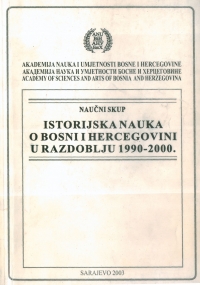
We kindly inform you that, as long as the subject affiliation of our 300.000+ articles is in progress, you might get unsufficient or no results on your third level or second level search. In this case, please broaden your search criteria.

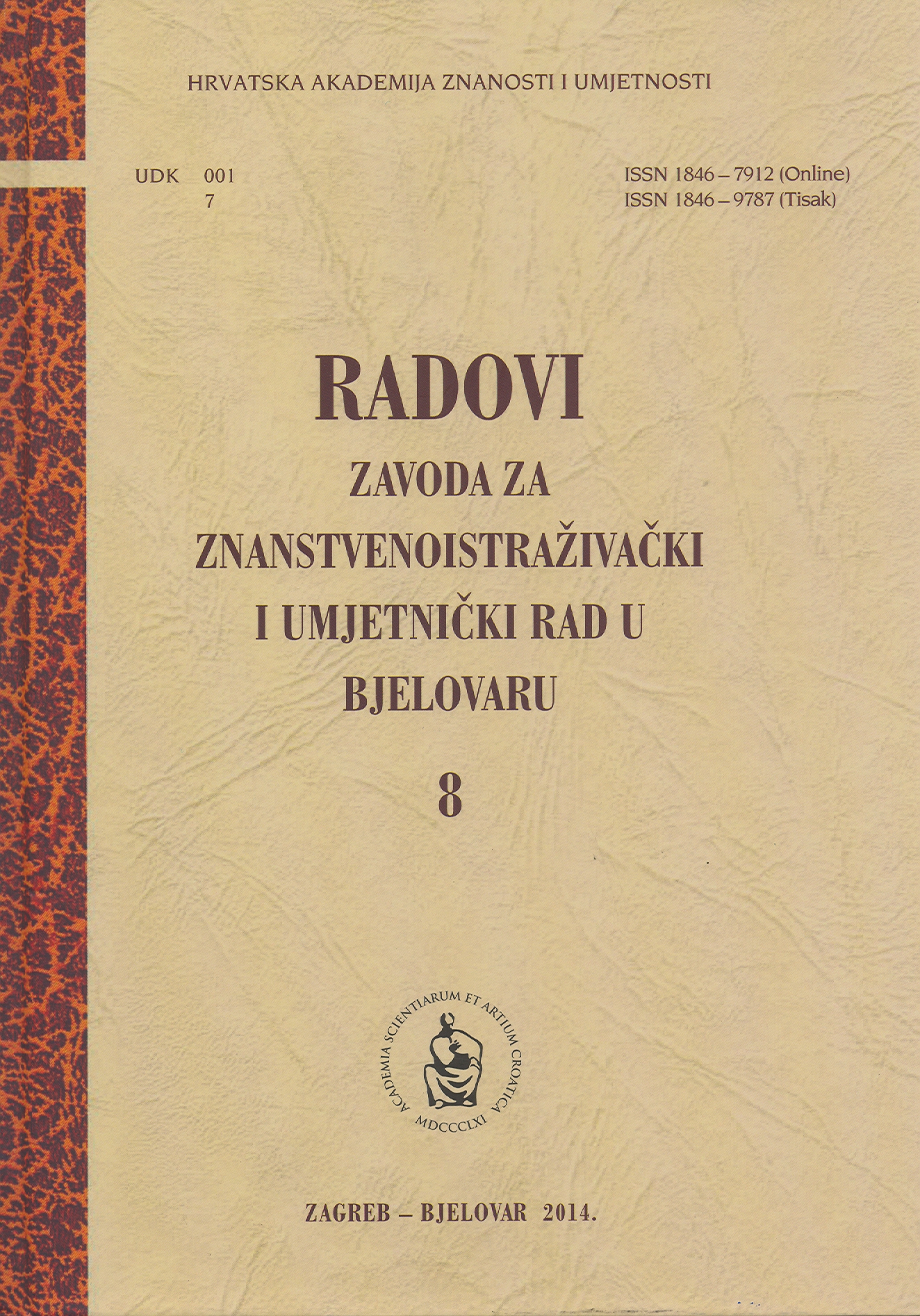
The Homeland War is the most important event in the recent Croatian history. The Republic of Croatia succeeded in gaining its independence and sovereignty, following, however, having suffered vast human and material losses. As nineteen years have passed since the end of the War, it is of major importance for us to learn from historical facts, so that we may avoid making mistakes in future. Young generations, who have, luckily enough, not been affected by the Homeland War, ought to become familiarised with the course, results and consequences thereof. Therefore, a poll-based research was carried out in order to evaluate the eighth-grade-student knowledge of the Homeland War before this topic was to be studied in history classes. The poll was conducted in two primary schools in the Bjelovar area. Poor knowledge was shown locally, which however does not exclude the possibility that the general state is the same in Croatia on the whole. The paper discusses natural factors that should result in gaining a better knowledge of the Homeland War: the meaning of the War and its consequences; wartime events in the Bjelovar area; active participation of the inhabitants of this area in battles, as well as in military and police operations during the War; and the wide-range availability of information via modern means of communication. The paper further discusses probable causes for the established poor knowledge – it is possible that family and close surroundings; school; social institutions and organisations; and popular culture have failed in this respect. It is evident that teaching school children of the Homeland War is at all levels inadequate – both quantitatively and qualitatively – and that positive activities that have positive results in this regard should be continually conducted throughout Croatia.
More...
In the first part, this study offers a reconstruction of the cultural life of Bjelovar and its surroundings – the Bjelovar literary and cultural circle (Bjelovar, Čazma, Đurđevac, Daruvar, Garešnica, Grubišno Polje) – by presenting portraits of writers, painters, musicians and educators; as well as by exhibitions, concerts, the work of associations and institutions; and a review of the publishing activity (newspapers, magazines, journals, books, monographs, etc.). The war havoc and the transitional deconstruction of the symbolic city capital (heritage, space) caused by globalisation are the two key elements that have formed not only wartime writings, but also the context in (the connection with) which they were created. The second part of the study is a presentation of wartime (1991–1995) and postwar (1996–2000) poetic writings in the Bjelovar literary and cultural circle, incorporated in poems and lyrical writings by numerous authors (V. Bažant, Ž. Sabol, K. Kovrlija, B. Kreštan, S. Frajtić, M. Mađerić, V. Vargović, I. Pejić, B. Jelušić, B. Delić, A. Perše Deškin, M. Vidović, K. Blaha, A. S. Prević, K. Prević, Z. Satrapa, L. Erl Luketa, D. Horvat Zácskai, M. Borovac, etc.). It forms a tribute to a better comprehension of Croatian wartime writings. The emphasis has been put on poetry – the poem and its structure as a humanistic analysis of the indifferent world, the understanding of the meaning of suffering and victim, self-perception and the perception of the other party – the enemy, with strong belief in the good and the victory thereof, as well as on the analysis of heritage and its endurance when facing the forces of destruction (wounded city, wounded land, etc.). The need for the as authentic as possible witnessing of the “severe reality”, wartime events, and memory in general determined the frequency of the genre of autobiographical/memoir literature, and the stylistic specificity of wartime writing as a pronouncedly documentary, factual/descriptive (stating the date and venue of the text), and in tone and directness similar to folk story telling – equally in prose, dramatic, and lyrical texts.
More...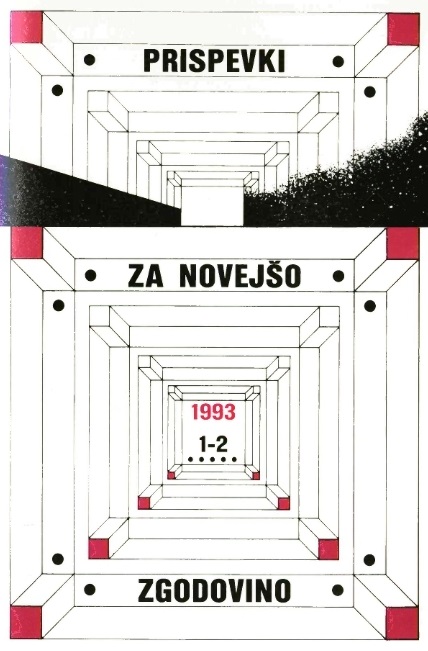
The review of: Janez Janša: Premiki. Nastajanje in obramba slovenske države 1988-1992. Mladinska knjiga Ljubljana 1992, 364 strani.
More...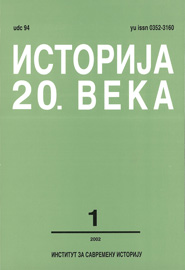
The problem of ensuring employment for war invalids came as one of the social consequences of World War I. The Yugoslav state had over 50.000 invalids who formally enjoyed certain forms of social benefits, including priority in employment. The actual state of affairs was quite different, however, and many companies and institutions regularly ignored the rights of invalids in this respect. The roots of this attitude lay in the social prejudices towards invalids prevalent in the rural and more traditional areas, and largely reflected in the views of the urban population. The theoretically undefined but omnipresent aversion to employing invalids was an unlawful but generally accepted form of repression exercised against this social group. The unwillingness of most employers to comply with the state’s social plans left invalids with very few job offers, resulting in a rapid deterioration of living standards for them and their families.
More...
The work attempts to show civil losses in Bosnia and Herzegovina on the basis of the partially revised census „Victims of War 1941-1945”. While counting for 15.7% of the entire Yugoslav population, the losses of Bosnia and Herzegovina represented 32.3% of the total number of war victims, with the civil population accounting for 81.4% of the victims. The Serbs, representing 44% of the population, whose total number objectively decreased during the war, formed 71.9% of the civilian victims. The fact that 81.9% were victims of the Ustashi and that 70.4% lost their lives during the first two years of war clearly indicates the intention to eradicate Serbs in Bosnia and Herzegovina. Despite the fact that Muslims accounted for 31 % of the population, they represented 15.6% of the victims, which places them second according to the number of victims. Exposed to various forms of oppression from the very formation of the Independent State of Croatia, the Jewish community was practically annihilated during the first two years of war. As a result, a community accounting for 0.4% of the population represented 6.8% of the total number of victims, more than 93.8% of which were killed by the Ustashi. Of the three majority nations in Bosnia and Herzegovina, the Croats suffered the least losses, accounting for 3.6% of the victims while representing 22% of the entire population.
More...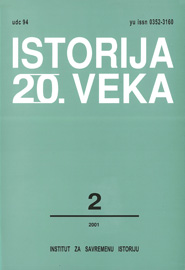
The Balkans, as part of the region of southeastern Europe and the eastern Mediterranean and an extremely sensitive and important geo-strategic area, has always been the subject of interest for the great powers, one of the focal points of their rivalry and confrontations in the continuing struggle for power in this part of the world. Hence, these powers have long had a strong influence on the events in this region, and on the fate of the countries occupying it and their inhabitants. The region of the Balkans is characterized by vast ethnic and religious variety and mixture, as well as by political divisions and antagonisms, and by divergence resulting from adherence to different systems of government or by being pan of the interest sphere of one of the great powers. The present situation is the direct consequence of the actions undertaken by the great powers in the past two hundred years i.e., from the time the European powers, Austria and Russia followed by others, began the process of suppressing the control of the weakening Ottoman Empire in Europe. The so-called eastern question was opened, a complex and sensitive issue, which set off a race for supremacy among the European powers and led to many disputes and wars with varying degrees of success for all involved. One of the consequences of the global conditions in this region has been the birth of various national movements formed in different periods by the peoples of the Balkans with the desire of attaining various national ideals and aims in the specific interaction of their own efforts and the actions of the great powers. The result has been the formation of independent Balkan states, weighed down by a heritage of numerous disputes, rivalries, and animosity not only among the Balkan nations but also between the great powers. Despite the fact that the eastern question was basically resolved by the Balkan Wars of 1912 and 1913, certain aspects of this issue have survived to the present day. The Serb people, present in both the central and the western parts of this region, living side by side and intermixing with many other ethnic groups yet retaining a strong tradition of statehood, have, like the other Balkan nations, been exposed to the influence of powerful external factors. The interaction between these factors and those born within the Serb nation has determined the historical fate of this people. The course ultimately taken and the wisdom of the decisions has mostly depended on the ability of the Serb ruling political elite to harmonize the interests of their people and country to the interests and intentions of the leading world factors at any period in Serb history.
More...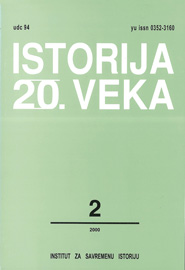
Information on new books: 1. Ivo H. Daalder and Michael E. O’Hanlon, WINNING UGLY: NATO’S WAR TO SAVE KOSOVO, (Ružna pobeda: NATO-ov rat za spas Kosova) Brookings Institution Press 2000, Washington, str. 224 2. Ivo H. Daalder, THE MAKING OF AMERICA’S BOSNIA POLICY, (Stvaranje američke politike u Bosni) Brookings Institution Press 2000, Washington, str. 204 3. Deliberated force: A CASE STUDY IN EFFECTIVE AIR CAMPAINING, (Oslobođena snaga: Studija slučaja u efikasnom vazdušnom ratovanju) edited by Robert C. Owen, Maxwell Air Force Base, Air University Press 2000, str. 541 4. Misha Glenny, THE BALKANS: NATIONALISM, WAR, AND THE GREAT POWERS 1804-1999, (Balkan: Nacionalizam, rat i velike sile 1804-1999) Viking Penguin, New York 2000, str. 726 5. Tim Judah, KOSOVO: WAR AND REVENGE, (Kosovo: Rat i osveta) Yale University Press, New Heaven 2000, str. 336 6. Michael Ignatieff, VIRTUAL WAR: KOSOVO AND BEYOND, (Virtuelni rat: Kosovo i iza) Henry Holt New York 2000, str. 249
More...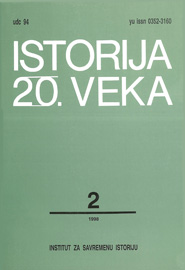
Reviews of: 1. SRBIJA U MODERNIZACIJSKIM PROCESIMA 19. i 20. VEKA. Knjiga 2, Položaj žene kao merilo modernizacije, Institut za noviju istoriju Srbije, Beograd 1998, str. 582. Review by: Nataša Miličević 2. Ljubodrag Dimić, SRBI I JUGOSLAVIJA, Stubovi kulture, Beograd 1998, str. 190. Review by: Đorđe Borozan 3. Branislav Božović, BEOGRAD POD KOMESARSKOM UPRAVOM 1941. GODINE, Institut za savremenu istoriju, Beograd 1998, str. 384. Review by: Miroljub Vasić 4. Dr Nikola Živković, dr Petar Kačavenda, SRBI U NEZAVISNOJ DRŽAVI HRVATSKOJ, Izabrana dokumenta, Institut za savremenu istoriju, Beograd 1998, str. 396. Review by: Slavko Vukčević 5. JASENOVAC-SISTEM USTAŠKIH LOGORA SMRTI, Saopštenja sa okruglog stola održanog u Beogradu 23. aprila 1996, Muzej žrtava genocida, Institut za savremenu istoriju, Beograd 1997, str. 242. Review by: Nenad Antonijević 6. Bojan B. Dimitrijević, VALJEVSKI RAVNOGORCI, Jugoslovenska vojska u otadžbini u Valjevskom kraju 1941-1945, Srpska reč, Beograd - Istorijski arhiv, Valjevo 1998, str. 320+32 ilustracije Review by: Milan Vesović 7. Samuel P. Huntington , THE CLASH OF CIVILIZATIONS AND THE REMAKING OF THE WORLD ORDER , Simon& Schuster, New York 1996, str. 368. Review by: Bojan B. Dimitrijević 8. Nebojša Jovanović, DNEVNIK SA REZERVISTIMA , ČIN, Beograd 1998, str. 232. Review by: Kosta Nikolić 9. LET - FLIGHT, Časopis za istoriju vazduhoplovstva, glavni i odgovorni urednik Čedomir Janić, Muzej jugoslovenskog vazduhoplovstva, Beograd 1998, br. 1, str. 290. Review by: Milan Vesović
More...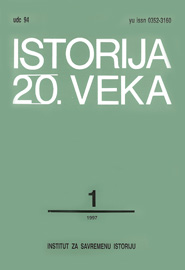
Review of: 1. Radoslav M. Raspopović, DIPLOMATIJA CRNE GORE 1711-1918, Istorijski institut Crne Gore i NIU »Vojska«, Podgorica-Beograd 1996, str. 696 Review by: Đorđe Borozan 2. DOBROVOLJCI U OSLOBODILAČKIM RATOVIMA SRBA I CRNOGORACA, Zbornik radova sa naučnog skupa, Institut za savremenu istoriju, Beograd 1996, str. 412 Review by: Dragoljub R. Živojinović 3. Milorad Ekmečić, Đorđe Mikić, Dragoljub Živojinović, Nikola В. Popović, POLITIČKI PROCESI SRBIMA U BOSNI I HERCEGOVINI 1914-1917, »Grafomark«, Laktaši 1996, str. 135 Review by: Dragan Tešić 4. Šarl Etinger et. al, ISTORIJA JEVREJSKOG NARODA, IP »Ginko«, Beograd 1996, str. 543 Review by: Nebojša Popović 5. KOMINTERN I VTORAJA MIROVAJA VOJNA. Čast’ I, 1939. do 22. ijunja 1941. g. (Rossijskaja Akademija nauk, Institut vseobšćej istorii. Gosudarstvennaja arhivnaja služba Rossii, Rossijskij centr hranenija i izučenija dokumentov novejšej istorii), prir. N. S. Lebedeva, M. M. Marinskij, otsv. red. К. M. A nderson, A. O. Cubarjan, Moskva, Pamjatniki istoričeskoj misli, 1994. str. 554. Review by: Dubravka Stajić 6. Žarko S. Jovanović, NOVA VLAST U SRBIJI 1941-1945, Institut za noviju istoriju Srbije, Zavod za udžbenike i nastavna sredstva, Beograd 1997, str. 395 Review by: Petar Kačavenda 7. VALJEVO 1941-1945. (Saopštenja sa naučnog skupa DOPRINOS VALJEVSKOG KRAJA U BORBI PROTIV FAŠIZMA 1941-1945), Valjevo 1996, str. 300. Review by: Bojan B. Dimitrijević 8. Dragoljub S. Petrović, SARADNJA ANTIFAŠISTIČKOG POKRETA U SRBIJI I BUGARSKOJ 1941- 1944, »Agena«, Beograd 1996, str. 228 Review by: Nikola Živković 9. Renéo Lukic, LES RELATIONS SOVIÉTO-YUGOSLAVES DE 1935 à 1945, De la dépcndence à rautonomie et à l’alignement (Jugoslovensko-sovjetski odnosi od 1935. do 1945, od zavisnosti preko autono¬mie do svrstavanja), Publications Universitaires européennes, Bern, Berlin, Frankfurt, New York, Paris, Wien, 1996, str. 256. Review by : Ubavka Ostojić-Fejić
More...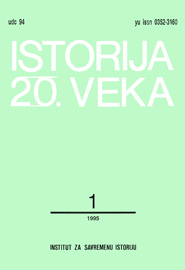
Kratki aprilski rat 1941. godine doneo je Jevrejima u Beloj Crkvi najteži udarac od njihove pojave na belocrkvanskom tlu uopšte. To je godina najpotresnijih svedočanstava о njihovom masovnom istrebljenju, ponižavanju, pljački njihove imovine, začetak monstruoznosti jeđne ideologije, godina potpunog nestanka Jevreja i jevrejske kulture sa scene belocrkvanske istorije. Hitler je podunavskim Nemcima, pa tako i onima u Beloj Crkvi, odredio značajnu ulogu u okupaciji Banata i širenju nacizma. Podunavski Nemci su trebali da budu u prvim redovima fronta nemačkog borbenog pokreta kao predstraža Rajha koja će omogućiti nemačko osvajanje.
More...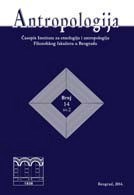
This paper will strive to present and perceive some of the current political, institutional, regional and other intragroup divisions between the Serbs and the Serb community in the area of the City of East Sarajevo, after the Civil war in Bosnia and Herzegovina 1992–1995. The foundation and development of Serbian Sarajevo, ie. East Sarajevo during and after the conflict, is examined along with the general geographical, economic, cultural and political context of that city. Data on the intragroup divisions of Serbs in this part of the Republic of Srpska (also called Serb Republic) and Bosnia and Herzegovina, was obtained on the basis of the fieldwork research conducted between the second half of October and the end of December 2017, as well as from mid-March to mid-May 2018. Narratives about the politics were collected through six formal and over fifty informal interviews with respondents on the current political situation and previous political developments, both in Bosnia and Herzegovina on the wider scale, as well as in East Sarajevo, on a narrower scale. Different views of the political processes and phenomena, in relation to the mainstream, have led to a gap between what has become known in the public as „the eastern and the western part of the Republic of Srpska“. The inhabitants of East Sarajevo with whom I lived, talked and participated in their everyday life, consider their region as being neglected politically, economically, and culturally. Separation among the Serbian community is not just caused by political but also institutional divisions, intertwined with each other, while regional divisions are built on the basis of cultural stereotypes about people from a particular area.
More...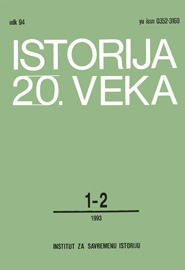
Jugoslavija je teško opstajala, od početka, na balkanskom trusnom tlu sučeljavanja antagonističkih civilizacija i ideologija. Pobeda Francuske i saveznika u Prvom svetskom ratu omogućila je da jugoslovenski unitarni liberali zauzmu istaknute pozicije u državnom i političkom vrhu Kraljevstva SHS. Ideološki duh građanskog liberalizma postaje bitno prisutan u mladoj jugoslovenskoj državi. Centrale evropskog građanskog liberalizma usađivaće ideje demokratizma i na tlo jugoslovenskih delova nekadašnjeg »cezaropapističkog« Habsburškog carstva. Uporedo sa tim, ići će intencija jačanja integracionih procesa u Kraljevini SHS. Ona će se javiti već od prvih dana stvaranja nove države, da bi se onemogućila eventualna restauracija Habsburgovaca, ali i sprečilo širenje boljševičke opasnosti. Slovenački liberali - Jugosloveni, povezani sa Sokolima, hrvatskim integralistima, pripadnicima bivše Hrvatsko-srpske koalicije i predratnom prečanskom revolucionarnom omladinom, biće glavni nosioci integralno-jugoslovenske nacionalne koncepcije.
More...
U osnovi krhkosti mlade jugoslovenske države sa početka 20. veka, ali još više imperativa njenog stvaranja, nalazili su se problemi ekonomske integracije Jugo-lstoka Evrope, tj. jugoslovenskog istorijskog prostora modernog doba. Ekonomska integracija kao jedan od bitnih činilaca formiranja državnih i društvenih zajednica modernog doba je pojava duboko u strukturi donjih slojeva Istorije, iznad kojih plivaju pojave koje pripadaju političkoj istoriji, i koje nisu imale u svakom trenutku Istorije Ijudi čvrste medusobne veze, kako se to tvrdilo dobar period 20. veka pod uticajem apsolutno-sociološke paradigme, vladajuće u delu istoriografije Evropskog Istoka. Politika i Ekonomija ispoljile su svoju izrazitu vezanost, međutim, u velikim tektonskim pomeranjima i poremećajima 20. veka, što su pokazala dva prethodna svetska rata, a pokazuju i najnoviji regionalni ratovi na Balkanu i u svetu, koji u kontekstu projekta tzv. »novog svetskog poretka« (u toku ovoga veka je bilo tri projekta) imaju obeležje trećeg svetskog rata.
More...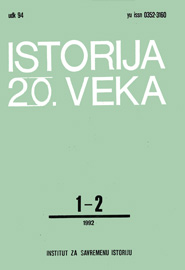
Poznati nemački »Drang nach Osten« je strukturalno višeslojna pojava kojom se ozbiljno bavila i jugoslovenska istoriografija, najviše doduše u njenom političkom , vojnom i ekonomskom ispoljavanju. Karakteristika radova iz ove oblasti je da su tu pojavu izučavali ili tretirali parcijalno, ali da nije data celovita studija, na koju se još čeka. Većina objavljenih studija ili članaka koji su se bavili opštom istorijom modernog doba, dotakli su se ovog problema posebno, jer je Nemačka bila aktivan učesnik i Prvog i Drugog svetskog rata, koji su ostavili katastrofalne posledice na balkanskim prostorima.
More...
Nacistička Nemačka otpočela je Drugi svetski rat, sa namerom da izvrši reviziju poretka uspostavljenog u Evropi posle Prvog svetskog rata i da uspostavi novi poredak, koji bi odgovarao njenim interesima, ne samo u Evropi, nego i u celom svetu. U početku Drugog svetskog rata nisu postojali opsežni planovi о tom poretku, ali posle većih uspeha Nemačke na frontovima u Evropi, a naročito posle pobede nad Francuskom 1940.godine, počeli su da se stvaraju planovi о tome, ali su oni daleko ргеmašivali mogućnosti nacističke Nemačke. U okviru tih globalnih planova, našlo se i pitanje Jugoistočne Evrope. Do skora, jugoslovenska istoriografija uglavnom je obrađivala nemačko-jugoslovenske odnose između dva rata, okupaciju, zločine, teror i ratnu štetu, znači, faktičko stanje pod okupacijom, a sasvim malo se bavila planovima Nemačke da uklopi Jugoistočnu Evropu u Hitlerov novi poredak. Upravo tu prazninu popunio je Milan Ristović, uzimajući to za temu doktorske disertacije, koju objavIjuje kao posebnu knjigu, a pod naslovom »Nemački novi poredak i Jugoistočna Evropa 1940/41-1944/45«.
More...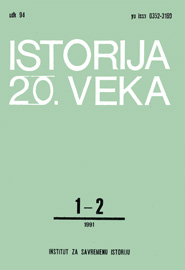
U vreme napada fašističkih država na Jugoslaviju, u proleće 1941, i donošenja istorijske odluke о dizanju oružanog ustanka a time i о otpočinjanju narodnooslobodilačkog rata protiv fašističkih porobljivača, u leto 1941, KPJ je već imala bogato iskustvo u borbi protiv fašističke opasnosti koja je već nekoliko godina neposredno ugrožavala nezavisnost i slobodu Jugoslavije i njenih naroda.
More...
Reviews of: 1. Savo Skoko, KOLUBARSKA BITKA, izdavač »Stručna knjiga«, Beograd 1990, 355 str. Review by: Miroslav Milojević 2. Vojislav Grol, PRAVNA MISAO MlLOVANA MILOVANOVIĆA, Srpska akademija nauka i umetnosti, OdeIjenje društvenih nauka, Izvori srpskog prava IX, Beograd 1989, 121 str. Review by: Momir Milojević 3. NOVO VIĐENJE 27. MARTA 1941. Prof. dr Branko Petranović - mr Nikola Žutić, »27. mart 1941.«, Beograd, 1990, strana 691 Review by: Zoran Lukić 4. GENOCID NAD SRBIMA U DRUGOM SVETSKOM RATU Review by: Milan Koljanin 5. Dr Savo Skoko, »POKOLJI HERCEGOVAČKIH SRBA 41«, Beograd 1991. Review by: Slavkо Vukčević 6. Mirko Peršen, USTAŠKI LOGORI, Globus, Zagreb 1990, 350 str. Review by: Milorad P. Radusinović 7. Vladimir Dedijer i Antun Miletić, GENOCID NAD MUSLIMANIMA 1941 - 1945, Zbornik sjećanja i svjedočenja, Sarajevo 1990, 879 str. Review by: Milorad P. Radusinović 8. ŽIVOT JEDNOG KRALJA - MEMOARI PETRA II KARAĐORĐEVIĆA, Novo delo, Beograd 1990, 405 str. Review by: Momčilo Pavlović 9. ILUSTROVANA ISTORIJA SRBA 1 - 4 , grupa priređivača, Litera, Beograd 1991. Review by: Momčilo Pavlović
More...
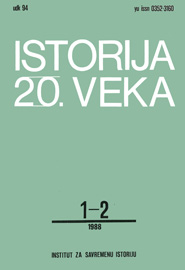
This supplement gives in a concise form, based on the data obtained from primary sources and abundant literature, all aspects and forms of the denationalization and genocide measures which were exercised by the enemy and domestic quislings during World War II against discriminated individuals as well as peoples in the south-east of Europe, firstly towards Jews, Serbs, Slovenes and Gypsies. The first chapter deals with the initial phase of the war, in the south-east also known as the arbitrage period in which the Axis powers, Germany and Italy, acting as judges, used the quarrels between Hungary and Rumania over the mixed inhabited Transylvania, to strengthen their influence in these two countries. The second chapter is dealing with various forms of forced emigration or rough turning out of homes of entire nationalities into other regions and countries. This system of racial purification of certain countries or regions was most roughly and massively applied in parts of Yugoslavia, especially towards Slovenes and Serbs. Stated facts bring on the conclusion that the major part of the Yugoslav citizens were, for a longer or shorter period, driven off or simply thrown out of their homes.The third chapter deals with document verified data that the German citizens also had to abandon their homesteads in especially large numbers towards the end of the war. Before the retreat of the German army in 1944, Volksdeutschers had to leave their homes and start the exodus towards the Reich. The fourth chapter is dealing with long-term measures of denationalization of certain nations: in the field of culture and education - no use of mother tongue or alphabet allowed; national schools closed down; all forms of cultural life hindered or forbidden, while the enemy's culture is forced upon the people; all forms of national tradition destroyed or erased etc; in the field of economy - confiscation of personal property; certain professions not allowed; in the field of religion - converting into the other nation's religion, as during the ,,NDH” (Independent State of Croatia) when the orthodox were converted into Roman Catholics, etc. This chapter also describes the system of race checks and administrative transferring of individuals and parts of the population into another, „higher" nation, as was done in parts of Slovenia which were included in the Reich.
More...